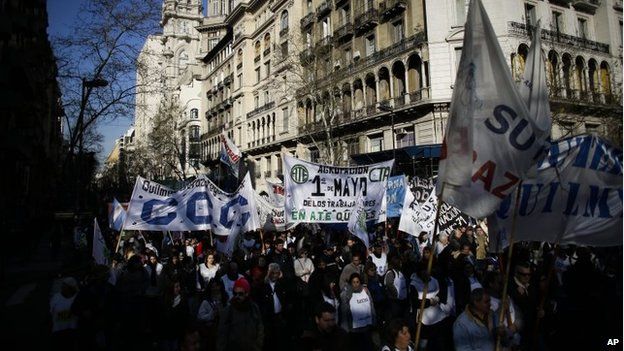Argentina strike causes disruption in Buenos Aires
- Published

Sections of Argentina's General Confederation of Labour (CGT) have gone on a 36-hour strike causing disruption in the capital, Buenos Aires.
The stoppage began at midday (16:00BST) on Wednesday and will run throughout Thursday.
Rail and air traffic as well as the country's ports, restaurants and bars are expected to be affected.
The strikers want higher salaries and tax cuts to counteract the rising cost of living and high inflation.
'Totalitarian'
The trade union movement in Argentina is divided into those who back the government of President Cristina Fernandez de Kirchner and those who think it is not doing enough to help workers.
This latest stoppage has been called by Hugo Moyano and Luis Barrionuevo, who belong to the more radical wing of the CGT.
It is the second nationwide strike they have organised in the past five months.
A number of smaller unions said they would join the action on Thursday.
Economic woes
The government has criticised the protest, saying it is "political in nature".
"There are trade unionists who are in opposition [to the government], and that's fine, but they should respect the citizens and leave their protest for 2015" when presidential elections will be held, Cabinet Chief Jorge Capitanich said.
Mr Capitanich said road blocks that protesters had erected on Wednesday were a "totalitarian" measure and urged them to allow Argentines to go about their daily lives without disruption.
Mr Moyano said the strike had broad backing as "there's a great desire to take part and show the government that people are fed up, tired and seeking answers to these demands that haven't been met".
The industrial action comes amid increasing economic problems for Argentina's government.
Unemployment rose to 7.5% in the second quarter as consumer spending and industrial output both fell.
The government has not issued any inflation figures since February, but according to Buenos Aires based research firm Elypsis, consumer prices rose by 38% from August 2013 to August 2014.
Growth is expected to be hampered further by the fact that Argentina is in a technical default after a New York court blocked its interest payment to bondholders last month.
- Published20 August 2014
- Published27 June 2014
- Published10 April 2014